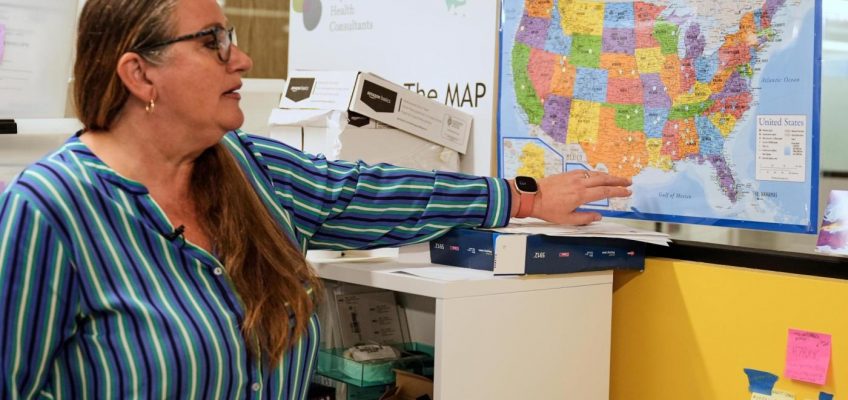Sarah Tang and Regeant Panday were following what many consider the path to the American Dream: college, marriage, house, kids. Tang’s parents followed that formula. Her dad pushed her to do the same.
“You need to buy a house to grow up,” Tang remembered thinking.
The couple decided to forgo a more expensive wedding and reception, opting instead for City Hall nuptials and a small dinner with friends. With savings and some family help, the millennial couple pieced together the roughly $110,000 needed for a down payment last summer on a three-bedroom Bridgeport home.
While Tang, 31, and Panday, 38, were able to achieve homeownership, it has left them “house poor”: spending an outsized portion of their income on homeownership. As a result, they’ve had to make sacrifices. They delayed buying a car. They cut back on dining out. They limit their grocery spending, shopping primarily at Aldi, a chain known for its low prices.
Despite the austerity measures, the crushing weight of rising housing costs has forced them to press pause on their plans to have kids.
“Ideally having children is a joyous thing where you have a partner and decide you want to grow your family,” Tang said. “But the financial piece is going to be a backstop to diving into that with less anxiety.”
“The American Dream, as much as it is an illusion, it feels unrelenting.”
Home prices and mortgage rates have risen in recent years since the booming COVID-19 pandemic real estate market came to a halt, a phenomenon that has been well documented. As a result, many young Americans have been shut out of the market.
Yet, the costs associated with owning a home — insurance, property taxes, maintenance, utilities — are also surging, causing couples like Tang and Panday to feel further disconnected from the lives they envisioned.
“When people are spending more of their money on housing expenses, they have less money to spend on other items,” said Daryl Fairweather, chief economist at Redfin. “When housing becomes too expensive, it does have a negative effect on local economics and the national economy as a whole.”
President Donald Trump made affordable housing a key part of his campaign. He pledged to bring about lower mortgage rates, to open federal land for housing construction and to ease building regulations.
Seven months into his presidency, his administration has paused efforts to preserve affordable housing redevelopments nationwide. Mortgage rates remain elevated. Provisions to sell federal land were removed from his “One Big Beautiful Bill Act,” and the U.S. Department of Housing and Urban Development has rolled back fair housing protections the agency said were stalling development — protections advocates say will decrease housing opportunities for Americans.
On top of that, Trump’s trade wars continue, which could increase housing costs. Although the rental and for-sale housing markets in Chicago and Illinois as a whole remain more affordable than many coastal cities, such as New York and Los Angeles, and some other states, Illinois still faces a severe housing shortage that is escalating affordability challenges.
Meanwhile, the dialogue around the country’s declining birth rate and how to fix it has ramped up since Trump took office. Trump has dubbed himself the “fertilization president.” Vice President JD Vance has referred to Democrats as “a bunch of childless cat ladies” and has said “we have to go to war against the anti-child ideology” in the United States.
But couples like Tang and Panday who want to have children say it doesn’t make financial sense for them right now. Their housing costs amount to about $4,000 a month, which includes their mortgage payments with an interest rate of 6.575%, property taxes, insurance and utilities. That does not count the surprise maintenance costs.
“Kids deserve to be taken care of well. No one should really struggle or go into debt to just make things work,” Tang said.
Bills, bills, bills
In a home filled with vegetarian cookbooks, verdant plants and two cats named Kaali (a Hindu goddess of destruction) and Aloo (potatoes in Nepalese), Tang and Panday started their second year of marriage.
Tang and Panday’s brick single-family home is wedged between two small multifamily buildings, sitting slightly back from the street on a quiet block. Behind a black iron gate, the door is marked with a wreath, and a cat sometimes lurks in the window.
Inside, the house is mostly furnished with items courtesy of Facebook Marketplace — the couple are avid users, “a little addicted even” to the platform, Tang said. She calls their design scheme “very typical millennial.”
Sarah Tang and Regeant Panday share space with their cats Kaali and Aloo, as they eat dinner at their Bridgeport neighborhood home in Chicago on July 17, 2025. (Chris Sweda/Chicago Tribune)
Tang, a nonprofit worker, and Panday, a biotech startup employee, have lived together for five out of the seven years of their relationship. The two met through a dating app in 2018 after they both ended up in Chicago.
They decided to buy a home because they said they were ready to stop moving around, invest in a community and get involved in local issues. Panday had finished his doctorate in biomedical engineering and had a newer full-time job with higher earnings; Tang had been in the workforce for nine years. They landed on Bridgeport partially for commuting purposes — Tang works in Chinatown and Panday works in Fulton Market.
The pair initially considered their house out of budget but quickly realized their ceiling of $450,000 was unrealistic for the neighborhood, especially when housing inventory was so low and homes for sale were receiving multiple offers. It was also a turnkey property, whereas cheaper homes on the market would have required renovations.
The property checked their boxes: ground-floor second bedroom for when their parents come to visit; room to grow their family and for hosting out-of-town guests; a backyard and garage.
So they put in a bid for $505,000, a bit below the asking price. They lost out. After a few months of house hunting, they were disappointed.
A week later, Tang got a call at work that the initial deal had fallen through. They were asked to rebid. They went with the asking price this time: $520,000. It worked.
“You finally got the thing you set out to want and then you get it. It was a little daunting for sure,” Tang said.
They soon began to feel the ups and downs of being new homeowners.
They didn’t use their backyard for two months because they said they weren’t accustomed to having outdoor space and then remembered to take advantage of it.
They had people over for dinner and hosted out-of-town guests.
Their insurance was initially quoted $900 lower than where their costs ended up because while the home listing said it was 100% brick, insurance marked their house as mixed material.
They discovered the house has two electric panels, one for the house and one for the garage. Two panels means two delivery fees from ComEd. Their garage electric delivery fee is around $22 for a bill of $4 otherwise.
The biggest challenge: The house was built around 1890, and it shows through their energy bills.
The couple’s gas bill soared to over $220 in the winter and dropped to $50 in the summer. Their summer electricity bill hit $190 last month, as the air conditioning was constantly running even with the temperature set at 78 degrees. The house easily allows the heat and cold to seep in. They rely on space heaters and open windows. When renting, Tang said their winter gas bills hovered around $120.
They spent $3,500 on insulation in an effort to address the heating and cooling issues, but it “barely changed anything,” Tang said.
Homeownership expenses — including typical monthly mortgage payments, homeowners and mortgage insurance and property taxes — accounted for 29.2% of the average income earned by a Cook County resident as of the middle of this year, up from the 23.2% historical average based on data collected between 2005 to 2025, according to ATTOM, a national property data provider.
That is lower than the 33.7% national average and slightly higher than the 28% typically recommended by mortgage lenders, the data shows.
For the average Chicago resident, 42% of their mortgage payment is for expenses such as property taxes and insurance, marking it the fourth-highest share in major markets across the country, according to Andy Walden, head of mortgage and housing market research for Intercontinental Exchange, a data and financial technology firm. This is in large part, he said, because of property taxes.
“Now we are a little bit romanticizing the renting days,” Tang said.
Surprise damages
Van and Lucia Nguyen met Tang and Panday through mutual friends around 2019 and bonded over their affinity for camping.
The Nguyens, both first-generation Americans and native Chicagoans, also bought a home in recent years: a three-bedroom, 1922-built Chicago bungalow in West Ridge. They needed more space after they got an 80-pound dog named Lupita during the pandemic.
The couple bought before mortgage rates shot up, in 2021, enabling them to land a 2.85% rate, well below what Tang and Panday secured three years later. The house, which Van Nguyen views as a starter home, sold for the asking price of $390,000 and their monthly costs — including mortgage payments, property taxes, insurance, utilities — are about $2,800.
Van Nguyen, left, mows the lawn while Lucia Nguyen weeds at their home in Chicago’s West Ridge neighborhood on Aug. 30, 2025. The couple, who both grew up in the Chicago area, were married and closed on their house in 2021. Despite the rising cost of homeownership, the Nguyens desire to move on with growing their family. (Dominic Di Palermo/ Chicago Tribune)
When closing on the house, the Nguyens were able to get $12,000 in closing cost credits since an inspector had noted the roof would likely need replacing.
That day came sooner than expected. When the first big storm hit two months after they closed on the house, Van Nguyen went up to the attic and heard drip-drops. The couple wound up spending around $14,000 on a new roof that fall.
The following spring, another storm hit and their basement flooded. Luckily, the couple had purchased insurance for this type of damage.
They spent $25,000 out of pocket before their insurance reimbursed them for the full amount. Van Nguyen borrowed the money from a sibling, he said, and if not for that, the couple would have delayed the repairs and temporarily moved out.
Even with the reimbursement, the Nguyens hit their insurance policy limit and could not afford to replace everything in their basement.
The premium on their insurance policy, which is through State Farm, went up 18%. Van Nguyen, who used to work in information technology at Allstate, shopped around for policies about three times in the last four years, he said, and still hasn’t found anything better.
Nearly 11% of single-family mortgage holders in Chicago switched insurance providers between 2023 and 2024, up three percentage points from 2022, the highest turnover rate in the more than 10 years of data available from Intercontinental Exchange.
Those Chicagoans who switched providers, on average, found slightly better rates elsewhere, paying 1% less than those who stayed with their existing providers, according to Walden of Intercontinental Exchange. Property insurance costs in Chicago rose by 15% — $275 annually — in 2024, Walden said, a tick up from the 14% increase seen nationwide. Over the past five years, Chicago’s single-family homeowners have seen a 60% average jump — $799 annually.
Van and Lucia Nguyen weed the backyard of their home in Chicago’s West Ridge neighborhood on Aug. 30, 2025. (Dominic Di Palermo/ Chicago Tribune)
Unlike Tang and Panday, the Nguyens are still able to save money and are moving ahead with their plans to have kids. They have family nearby to help and more flexibility with their remote jobs. Even with the “chaos of the world,” Van Nguyen said, he feels confident in their decision, especially as his wife gets older. Van and Lucia Nguyen are both 36.
He can’t imagine selling his house right now. He does not think renting would be cheaper. The only option, he said, would be moving to a state with lower taxes, but he does not want to do that. “The politics don’t line up,” he said. And he would have to move his aging mother, whom he supports financially.
Home
Tang grew up in Hong Kong and Panday in Nepal, both moving to the United States for college.
Prior to Bridgeport, they lived together in a three-floor walk-up in Pilsen with no dishwasher or kitchen counter space and laundry in the basement. They noticed Chicago rent prices blowing up and thought they could get more bang for their buck buying a house, even with the extraneous costs. They are still happy with their decision to buy a home.
“We came here for school and moved around a lot so it’s kind of like you’re living a nomadic life,” Panday said. “Being able to call something your home gives us a sense of stability.”
“I think Chicago … this is where we want to be and we want to build our life, and we have been doing that for a long time. Being able to have our house does mean we aren’t going anywhere for a while,” Tang said.
“Fingers crossed,” Panday chimed in, laughing.
Regeant Panday walks through his Bridgeport neighborhood home in Chicago on July 17, 2025. (Chris Sweda/Chicago Tribune)
Tang and Panday say they feel a sense of guilt about sharing their housing woes — especially with their friends who are renters. They think to themselves: At least we own a home, right?
“It’s been difficult adjusting,” Tang said. “It’s been a year, and I don’t think we have gotten to the level of being able to save progressively again. I don’t see that happening for a while.”
Knowing their property taxes are based on reassessments that happen every three years and watching inflation outpace their incomes, they say it is difficult to predict when the money won’t be as tight and they’ll be able to start a family. For Panday, a higher-paying job would be much farther outside the city, he said. Tang is witnessing funding cuts in the nonprofit world.
Tang envisioned starting a family before 35. She and Panday are aware of their biological clocks.
But as long as they aren’t saving money, the kids will have to wait.
ekane@chicagotribune.com




